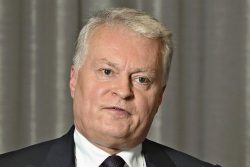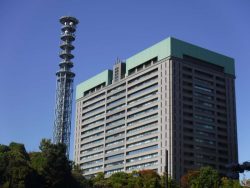Russia Using More DPRK-Made Missiles in Ukraine; Report Finds 74 Fired in July-Dec., After Moscow-Pyongyang Treaty

16:20 JST, February 23, 2025
GENEVA / PARIS — Since Russia and North Korea signed their mutual defense treaty in June last year, the number of missiles fired by the Russian military against Ukraine that are believed to have been made in North Korea has increased sharply. Moscow fired 74 such missiles between July and December, according to an analysis by The Yomiuri Shimbun.
The Treaty on Comprehensive Strategic Partnership stipulates mutual military support in the event of an emergency, and it appears Russia and North Korea have been strengthening their cooperation in actual combat.
The Yomiuri Shimbun analyzed data on Russian missiles and drones compiled and published by the Center for Strategic and International Studies, a U.S. think tank, based on information released by the Ukrainian military and other sources.

A representative from the prosecutor’s office shows parts of an unidentified missile, which Ukrainian authorities believe to be made in North Korea and was used in a strike in Kharkiv amid Russia’s attack on Ukraine on Jan.6, 2024.
Eight North Korea-made KN-23 missiles or missiles highly likely to be KN-23 were fired from January to June last year, and the number increased sharply to as much as over nine times during July and December.
In August and September, 24 such missiles were fired in each month. The percentage of missiles fired by the Russian military believed to have been manufactured in North Korea increased to 6.7% in the second half of the year from 0.7% in the first half.
KN-23 is a short-range ballistic missile with a range of about 900 kilometers. It is believed to be difficult to intercept as it flies at a low altitude and on an irregular trajectory. The missile is thought to have been developed based on the Russian-designed short-range ballistic Iskander.
“Russia may have begun the full-scale use of North Korean missiles in the wake of the formalization of the bilateral treaty. Moscow will continue to strengthen its dependence on Pyongyang,” said Shinji Hyodo, a senior researcher at the Defense Ministry’s National Institute for Defense Studies.
With the treaty, which came into effect in December, Russia and North Korea forged a de facto military alliance. Reuters quoted a Ukrainian military source saying that North Korean missiles with improved capabilities began to be used in December.
"World" POPULAR ARTICLE
-

Japanese Firefighter Who Worked in Quake-Hit Myanmar Hopes Others Will Help in Intl Relief Efforts
-

Glass Stresses Need for U.S.-Japan Alliance to Invest, Innovate; Commends Japan for Taking Leading Role in Region
-

Head of Interim Bangladesh Govt Yunus: Election to Be Held Between Dec. 2025 and June 2026; Cotton, LNG Eyed as Bargaining Chips in Bangladesh-U.S. Trade Talks
-

Egyptian Candidate for Unesco’s Top Spot Stresses Agency’s Role in Times of Crisis
-

Vietnam, Thailand Aim to Grow Rice Exports to Japan
JN ACCESS RANKING
-

Aichi Rice Production Under Siege from Warming Climate; Record Heat Stunts Crop Growth, Causes Greater Pest Activity
-

Japanese Researchers Develop ‘Transparent Paper’ as Alternative to Plastics; New Material Is Biodegradable, Can Be Produced with Low Carbon Emissions
-

Trump: Nippon Steel Will Part Own U.S. Steel, U.S. to Be in Control; Share Distribution, Other Details Remain Unclear
-

Japan’s Core Inflation Hits More than 2-year High, Could Force Year-End BOJ Hike
-

Japan’s Cooperation in Alaska LNG Development Project Emerges in Japan-U.S. Tariff Negotiations; But Industry Concerns Exist























